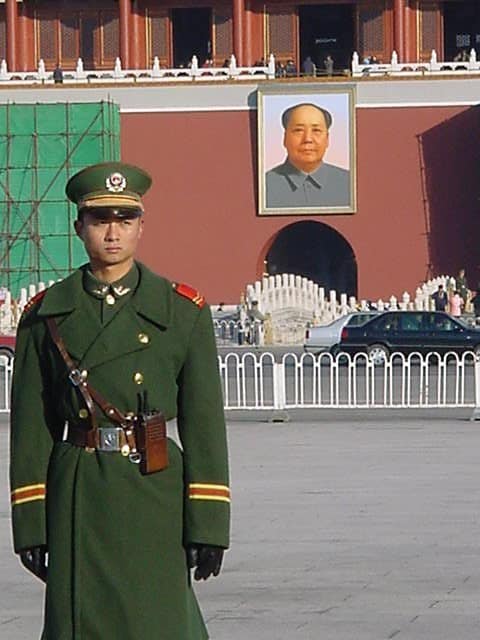
Tensions build in Hong Kong: Protesters do not back down from their Pro-Democracy fight
Soldiers stand guard in Tiananmen Square, the site of the 1989 massacre of pro-Democracy protesters in China.
Kaison Holloway, Staff Writer
“Democracy now! Democracy in Hong Kong!” has been shouted throughout the streets of China for weeks according to NBC news.
What started on September 28 with a few students has grown into a massive protest movement. Witnesses say there have been up to 200,000 participants risking their lives for pro-democracy.
As of October 15, protesters have been hit with tear gas and pepper spray, and dozens have been arrested to rid the streets of nonconformists. Footage of beaten, handcuffed protestors flooded media in Hong Kong. This situation caused some to flash back to Tiananmen Square.
This was a seven week protest in 1989, centered on Tiananmen Square in Beijing, China and ending in a brutal massacre.
On June 3 and 4, 1989, the Chinese military painted the grounds of Beijing with the lifeless bodies of hundreds of protestors. Tanks and assault rifles were used on unarmed civilians to end pro-democracy protests.
The question now is, will an event like that occur yet again? Several sources shared their thoughts on this serious, yet neglected topic.
“I like that the people of Hong Kong are fighting for the basic human rights of freedom of choice,” said Senior Airman Aaron O’Neal, who currently serves as a security forces officer in the United States Air Force. “I don’t like the police force in Hong Kong and that they are ruled by a corrupt government.”
Having experienced tear gas as well as pepper spray, O’Neal said, “They are not pleasant feelings and should not be used against a nonviolent group.”
“When the United Kingdom withdrew in 1997 China promised Hong Kong it would continue to respect its different electoral process,” said North Greenville University history professor Robert Boggs. “China has reneged on that, and now they have understandable protests on their hands.”
M. Dujon Johnson, new to the North Greenville History Department, is no infant to the history and study of China. Johnson has lived or worked in China for over 22 years, partly completing undergraduate and graduate studies, but also as a scholar in Mainland China and Taiwan. He is currently a law professor at Chongqing University of Technology in Chongqing, China. He holds the distinction of being the only African-American to receive a Ph.D from China.
“The students who were protesting in 1989, it wasn’t democracy or the Chinese population as a whole …,” said Johnson. “These were very elite students and they weren’t saying, ‘let’s open up the doors for the Chinese people or country,’ they were saying, ‘let’s open up the doors for us.’”
“Even they admit,” Johnson said on the issue, “it’s a losing battle … it’s too little too late.”
Speaking on the current protests, Johnson said, “These protests are for everyone … it’s a protest that includes the whole Hong Kong population … office workers join on their lunch breaks, you’ll see cab drivers joining, you’ll see sanitation workers joining.”
Johnson said another Tiananmen Square event is not likely to occur.
A lead protestor named Joshua Wong was quoted in “USA Today” saying, “We are not seeking revolution. We just want Democracy!” These protestors do not appear to be in search of violence, they merely want the freedoms and equalities many take for granted.

